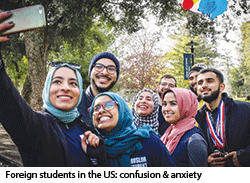 After the election of Donald Trump as US president in November, art student Usman Anwar painted a work he called “Freedom”, depicting an angel covering her eyes with her wings. Now he knows how she feels. A Pakistani with a student visa, he returned from the midwinter break at Adelphi University near New York the day before Trump proposed a ban on travel from seven predominantly Muslim countries. Already, he says, the immigration process was more stringent than before. “They were questioning us more, lining us up, separating out the students,” says Anwar. “I was not sure what was happening.”
After the election of Donald Trump as US president in November, art student Usman Anwar painted a work he called “Freedom”, depicting an angel covering her eyes with her wings. Now he knows how she feels. A Pakistani with a student visa, he returned from the midwinter break at Adelphi University near New York the day before Trump proposed a ban on travel from seven predominantly Muslim countries. Already, he says, the immigration process was more stringent than before. “They were questioning us more, lining us up, separating out the students,” says Anwar. “I was not sure what was happening.”
Now, although the travel ban has been repeatedly blocked by federal judges, and Pakistan was never on the list, Anwar is among many international students who have elected to stay back in the US for the summer out of fear that if they leave they won’t be allowed back in.
International students seldom stay at American universities during the long summer break between academic semesters, which runs from May until the end of August. Few universities are equipped to accommodate them if they do. But this summer, several have not only made room for international students to remain; they have found them jobs and raised money to help them cover expenses over the summer.
Anwar, for instance — the youngest of four children — says that his father hadn’t budgeted for him to live in the US through the summer. Adelphi allowed him to stay, offered him a job as a graphic designer and set aside a funds pool to help him and other international students. A crowdfunding campaign provided additional support.
“With the rhetoric coming out of the White House, students just have no clue what could happen,” says Wendy Badala, director of international student services at Adelphi and also of the university’s Interfaith Center. “There is a nervousness and anxiety that these students and their families have, and as a university we wanted to make sure that we put them at ease.”
With higher education in its quiet season, the unusual presence of international students on campuses in the summer is a reminder of the huge stakes of Trump’s contentious immigration policy. Announced in January, Trump’s order would have imposed a 90-day halt on issuing travel visas to citizens of Iran, Iraq, Libya, Somalia, Sudan, Syria and Yemen. It was almost immediately blocked by a federal judge, but has since been allowed by the Supreme Court, with Iraq removed from the list and individuals with a “credible claim of a bona fide relationship with a person or entity in the United States” excluded.
The confusion has only made things worse for international students, according to university officials. “It’s really hard to advise students when we just don’t know what might happen. That’s the trouble with this administration. Things could change in an hour, and we don’t know,” says Badala.
Among other institutions to provide assistance to international students, Lawrence University in Wisconsin offered summer housing and jobs to those who wanted to stay, and about 20 of them have. Since the dining halls are closed for the summer, it is providing shuttle buses to supermarkets; if students cancelled airline tickets, the university gave them housing credits equal to any penalties they paid.
Ithaca College in New York invited students from countries subject to the travel ban to stay for free, although they have to pay for their meals. Several from other countries asked too, and were given housing. Anxiety like this will have a long reach, believes Anwar, back at Adelphi. “The United States of America is a land of opportunity. Everyone wants to come here to study. But eventually people who can afford other places, maybe with these politics, they won’t want to send their kids here even if their kids want to come,” he says.